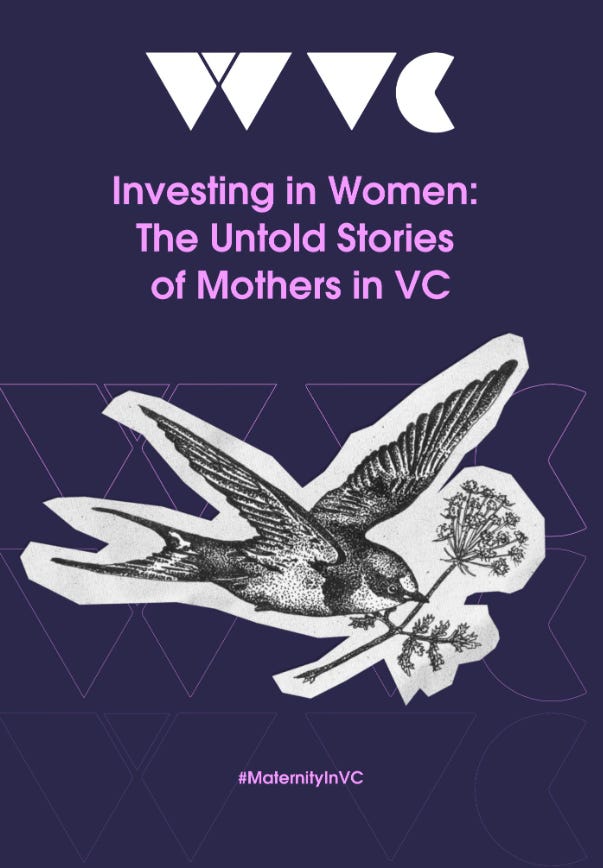Maternity in Venture Capital: 7 in 10 Women Concerned About the Return to Work
by Sophie Winwood, co-founder & CEO of WVC:E.
Guest post by Sophie Winwood, co-founder & CEO of WVC:E.
Key highlights from the report:
A new report from WVC:E shares the untold stories of mothers in venture capital.
120 women in VC from almost 20 countries and funds ranging from less than €50M to upwards of €500M were surveyed for the report - 80 per cent of whom are already mothers.
Respondents' top three main concerns were career progression, the long-term sustainability of working in VC as a parent and establishing boundaries around work.
84 per cent of women surveyed shared that parental leave, both time off and the level of pay, was a concern.
London, UK. 10th October 2024: WVC:E has shared a critical report and survey results into motherhood and venture capital. ‘Investing in Women: The Untold Stories of Mothers in VC’ has gathered insights and data from women across European venture capital, analysed parental leave and pay policies across Europe, and interviewed 20 female VCs to present the challenges of navigating VC as a mother.
Data from 120 respondents from 20 European countries and various fund sizes has revealed the following.
Over two-thirds (71 per cent) of women planning on having children or more children were concerned about returning to work in venture capital, and one in five respondents (20 per cent) were very concerned.
Almost 80 per cent of respondents felt there was room for improvement in their return to work process, and just over one in three (38 per cent) said there was considerable room for improvement.
The top three concerns shared by respondents were career progression/promotion opportunities (32 per cent), the long-term sustainability of working in VC and parenting (25 per cent), and establishing boundaries, e.g., evening events (23 per cent).
84 per cent of respondents were concerned about parental leave (the amount of time off or the pay level).
The venture capital industry remains male-dominated despite relatively rapid progress in recent decades. Women comprise 16 per cent of European General Partners, and women comprise only a third of investing teams. In the UK, there has been no change in the gender composition of teams since 2019, with female representation flat at 30 per cent.
Sophie Winwood, CEO of WVC:E, said:
“The findings in this report shine a light on the unique challenges women face in venture capital, especially when balancing motherhood with the demands of the industry.
Our goal is not to place blame but to foster understanding and inspire meaningful change. By sharing these experiences, we hope to offer valuable insights, spark important conversations, and drive action across the wider ecosystem — in workplaces, homes, and communities.
It's time to rethink how we support women and build an environment where they can thrive without choosing between career and family.”
Ruth Foxe Blader, GP of Foxe Capital and Chair of WVC:E, said:
“Maternity and early childcare policy is critical infrastructure needed to rectify employment and pay inequity. But it’s totally taboo!
The social dimension is almost more important than the statutory. This report talks about it honestly and all of its complexity.”
Check Warner, co-founding Partner Ada Ventures and co-founder of Diversity VC, said:
“The concerning stats in this report should be a wake-up call for the VC industry where parents, particularly women, have been massively let down. Unfortunately, the findings in this report chime with the stories of numerous women who have children when working in VC and have felt completely unsupported by the funds they work for. This is a big missed opportunity, as VC should be compatible with having a family.
If we as an industry don’t fix this, we will miss out on the best talent and, therefore, the best returns for investors.”
The report explores women’s concerns around parental leave and the differences between men's and women’s leave, returning to work and setting boundaries regarding policies and practices. It highlights some of these challenges' impacts and offers practical tips on navigating them. The report concludes with recommendations for partners, colleagues, General Partners and the community to improve the status quo for women, men and the industry overall.



